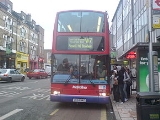
London Buses route W7
Encyclopedia
London Buses route W7 is a Transport for London
contracted bus route in London, United Kingdom. The service is currently contracted to Metroline
. Cash fares are not available on this route.
. The LNER, who owned the line, did not strengthen the bridge as the 212 competed with the railway.
The 212 became a double-deck operation in 1963 with RTs
from Muswell Hill garage. Routemaster
s, spare from route 43, ran at weekends. In 1969 the 212 was renumbered W7. The letter prefix showed that it was a local flat fare route, the letter used indicated the area served, but not uniquely, e.g. H applied to both Harrow and Hounslow, R to Richmond and Romford.
The route later ran with Daimler Fleetline
and then MCW Metrobus
buses, all from Muswell Hill garage until its closure in 1990 when the route was transferred to Holloway. On privatisation in 1994 the route was run by London Northern, later Metroline. The route used Metrobuses and Volvo Olympian
/Northern Counties Palatine
II (V class).
Later still a mix of low-floor double-deckers from Holloway garage with Trident and Volvo with Plaxton President bodywork, with both long and short base, was used. The long buses are used more on the W7 especially the Volvo type. Dennis Trident/Plaxton President (TP 1-65) rarely feature on the route.
Route W7 was chosen to trial the cashless "Pay Before You Go" system whose aim was to speed up boarding. From 17 October 2001 http://www.tfl.gov.uk/assets/downloads/corporate/agenda27Nov-2001.pdf each passenger, before boarding, needed a valid ticket or travel card bought from an agent or a road side ticket machine. The system worked and was extended on 23 August 2003 to all routes in the West End of London and to all bendy bus routes.
Transport for London
Transport for London is the local government body responsible for most aspects of the transport system in Greater London in England. Its role is to implement the transport strategy and to manage transport services across London...
contracted bus route in London, United Kingdom. The service is currently contracted to Metroline
Metroline
Metroline, owned by ComfortDelGro Corporation of Singapore, is one of many companies operating bus services in London under the management of London Buses.-Company history:...
. Cash fares are not available on this route.
History
The W7 started as the former route 212, which had express variations from 1960 until 1968, and used single-deck buses for many years due to a weight restriction on the bridge by the former Muswell Hill railway stationMuswell Hill railway station
Muswell Hill railway station was in the Muswell Hill district of north London just north of the road junction of Muswell Hill and Muswell Hill Place...
. The LNER, who owned the line, did not strengthen the bridge as the 212 competed with the railway.
The 212 became a double-deck operation in 1963 with RTs
AEC Regent III RT
The AEC Regent III RT was a variant of the AEC Regent III. It was a double-decker bus produced jointly between AEC and London Transport. It was the standard red London bus during the 1950s.-Prototype:...
from Muswell Hill garage. Routemaster
Routemaster
The AEC Routemaster is a model of double-decker bus that was built by Associated Equipment Company in 1954 and produced until 1968. Primarily front-engined, rear open-platform buses, a small number of variants were produced with doors and/or front entrances...
s, spare from route 43, ran at weekends. In 1969 the 212 was renumbered W7. The letter prefix showed that it was a local flat fare route, the letter used indicated the area served, but not uniquely, e.g. H applied to both Harrow and Hounslow, R to Richmond and Romford.
The route later ran with Daimler Fleetline
Daimler Fleetline
The Daimler Fleetline is a rear-engined double-decker bus chassis built between 1960 and 1973 in Coventry, Warwickshire, England, and from 1973 until 1980 in Farington, Lancashire, England. However, the last complete vehicle did not enter service until 1983...
and then MCW Metrobus
MCW Metrobus
The MCW Metrobus is a double decker bus model manufactured by MCW from 1977 until 1989, with over 4,000 examples built. The original MkI model was superseded by the MkII model in 1981/1982, although production of the original MkI continued for London Transport until 1985...
buses, all from Muswell Hill garage until its closure in 1990 when the route was transferred to Holloway. On privatisation in 1994 the route was run by London Northern, later Metroline. The route used Metrobuses and Volvo Olympian
Volvo Olympian
The Volvo Olympian was a rear-engine double decker bus built by Volvo at Irvine, North Ayrshire, Scotland. It was first built in 1992 and entered production in March 1993, replacing the Leyland Olympian....
/Northern Counties Palatine
Northern Counties Palatine
The Northern Counties Palatine is a step-entrance double-decker bus body built by Northern Counties of Wigan, UK. It was built mainly on Leyland Olympian and Volvo Olympian chassis, although some were also built on DAF, Volvo B10M Citybus and Scania chassis...
II (V class).
Later still a mix of low-floor double-deckers from Holloway garage with Trident and Volvo with Plaxton President bodywork, with both long and short base, was used. The long buses are used more on the W7 especially the Volvo type. Dennis Trident/Plaxton President (TP 1-65) rarely feature on the route.
Route W7 was chosen to trial the cashless "Pay Before You Go" system whose aim was to speed up boarding. From 17 October 2001 http://www.tfl.gov.uk/assets/downloads/corporate/agenda27Nov-2001.pdf each passenger, before boarding, needed a valid ticket or travel card bought from an agent or a road side ticket machine. The system worked and was extended on 23 August 2003 to all routes in the West End of London and to all bendy bus routes.

